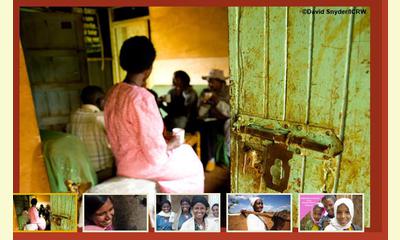|
|
We can end world hunger if we end violence to women.
an article by Janet Hudgins
So says Sarah Degnan Kambour, who wrote this for
The Guardian
just in time for the G8 Summit in Ireland next
week. Kambour is president of the International Center
for Research on Women, a non-profit based in
Washington, DC.

photo from ICRW website. Copyright David Snyder (ICRW)
click on photo to enlarge
She writes, “When women live free from violence
they have a better chance of earning an income,
and are more likely to focus their spending, and
energy, on their children . . . because they are
primarily responsible for ensuring nourishing food
is available for their families.”
The G8’s mandate is, among other things, to
stabilize the global economy, but you can’t talk
about the economy without including women and
food, its source and security; they are all in the
same package. However, this year’s agenda features
only Tax, Trade and Transparency.
According to the UN Millennium Campaign, women do
two-thirds of the world’s work, produce 80% of its
food but hold only 10% of the wealth and one per
cent of the land. Add to that the incidence of
abuse.
Kambour writes that worldwide, one in every three
women suffer abuse, but as much as 70% in
countries where cultures deny them human rights.
The result is the loss of valuable sustenance for
children, and broken women. Indeed, many are so
young they are not yet women but are physically
forced to perform as mature adults. The G8 is
comprised of the world’s most powerful countries
and it should find it obligatory to include an
article to stop this age-old practice in its
mandate.
The EU announced it will spend an unprecedented
€3.5 billion in applied research on improving
nutrition in some of the world's poorest countries
between 2014 and 2020. And the G8 has made a
declaration to stop violence to women in conflict.
But, neither the EU nor the G8 is considering the
dilemma of women as providers, at least not this
year.
I agree with Kambour that it would behoove the G8
to genuinely act to prevent violence to women
worldwide and under all circumstances. With the
high incidence of abuse and three million child
deaths from malnutrition a year the Summit should
clear part of its agenda for an initiative to
ensure the safety of women, thus the safety of
food, if it is to accomplish its mandate to act on
matters related to world economic matters.
|








|
DISCUSSION
Question(s) related to this article:
What other resources can be utilized to give women more opportunities?,
* * * * *
LATEST READER COMMENT:
On their website, the United Nations Population Fund makes it clear that lack of access to family planning is a form of violence against women.
"Gender-based violence both reflects and reinforces inequities between men and women and compromises the health, dignity, security and autonomy of its victims. It encompasses a wide range of human rights violations, including sexual abuse of children, rape, domestic violence, sexual assault and harassment, trafficking of women and girls and several harmful traditional practices. Any one of these abuses can leave deep psychological scars, damage the health of women and girls in general, including their reproductive and sexual health, and in some instances, results in death.
Violence against women has been called "the most pervasive yet least recognized human rights abuse in the world." Accordingly, the Vienna Human Rights Conference and the Fourth World Conference on Women gave priority to this issue, which jeopardizes women's lives, bodies, psychological integrity and freedom. Violence may have profound effects – direct and indirect – on a woman's reproductive health, including:
Unwanted pregnancies and restricted access to family planning information and contraceptives
Unsafe abortion or injuries sustained during a legal abortion after an unwanted pregnancy
Complications from frequent, high-risk pregnancies and lack of follow-up care
Sexually transmitted infections, including HIV
Persistent gynaecological problems
Psychological problems
Gender-based violence also serves – by intention or effect – to perpetuate male power and control. It is sustained by a culture of silence and denial of the seriousness of the health consequences of abuse. In addition to the harm they exact on the individual level, these consequences also exact a social toll and place a heavy and unnecessary burden on health services.
UNFPA recognizes that violence against women is inextricably linked to gender-based inequalities. When women and girls are expected to be generally subservient, their behaviour in relation to their health, including reproductive health, is negatively affected at all stages of the life cycle.
UNFPA puts every effort into breaking the silence and ensuring that the voices of women are heard. At the same time, the Fund works to change the paradigm of masculinity that allows for the resolution of conflict through violence. . ...more.

|
|









